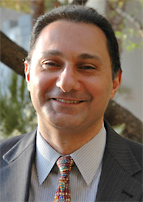
Name: Sam Arbabi, MD, MPH
Title: Professor of Surgery
Institution: University of Washington and Harborview Medical Center
Clinical Specialty: General Surgery, Trauma, Critical Care
Research Interest: Inflammatory and infectious cell signaling, Trauma outcomes
Webpage: http://www.medical.washington.edu/bios/view.aspx?CentralId=905&Unpublished=false
Institution during SIS Fellowship: University of Michigan
SIS Fellowship Mentor: Ronald V. Maier
SIS Fellowshp Project Title: The Effect of Protein Kinase Inhibition on the Rate of Wound Infection
Fellowship Years: 2003-2004
Published Manuscripts as a result of funding through SIS fellowship:
- Ipaktchi K, Mattar A, Niederbichler AD, Hoesel LM, Vollmannshauser S, Hemmila MR, Minter RM, Su GL, Wang SC, Arbabi S. Topical p38 MAPK inhibition reduces bacterial growth in an in vivo burn wound model. Surgery 2007; 142(1):86-93.
How did you hear about the SIS Fellowship? I had presented many times during my residency and fellowship at the annual SIS meetings, and my mentor encouraged me to apply.
Who was the main influence on your choice to become an academic surgeon? Ronald Maier
Can you elaborate? I was always interested in research, trying to do something new, understand why, and improve the care of patients. Dr. Maier showed me that academic surgery is where I belong.
How did you get involved in surgical infections research? I was interested in the topic, and my mentor was a past president of the Society.
Can you describe how the fellowship helped your career? My current NIH R01 grant, with potential for new drug development, is the direct extension of my SIS junior attending fellowship project.
What would you tell medical students who are interested in surgery? Go for it.
What suggestions would you give to residents who would like to pursue research projects? First, answer this main question, "Why do I want to do research?" The answer is different for everybody, such as "I love research", "I want to get a good fellowship", "I want to become an academic surgeon", etc. Pick a general topic that interests you. Then find a good mentor. A good mentor is not always the most famous one. Your mentor must be interested in you and your career. A personal connection is important (do not pick someone that you do not like).
What about obtaining funding? Just apply and do not get disappointed. If you hear 10 negative responses for each positive one, then you are a winner.
How did you first get involved in the Surgical Infection Society? As a research fellow, I submitted abstracts and presented. Then I joined various committees.
What was it like to attend the SIS Meeting as a resident? Educational, get to know people, understand the field, improve your presentation, talk to “Who’s Who” in surgery, find your future collaborators, and all around fun.
Do you recall your first presentation there? My first SIS oral presentation was during the 1999 annual meeting in Seattle, "Priming Interleukin-8 production: the role of platelet-activating factor and p38”
Why should young investigators get involved in SIS? SIS community is a group of physicians and scientists that are ready to support new investigators.